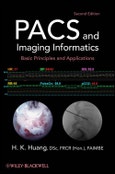In recent years, the field of picture archiving and communications systems PACS andimage informatics has advanced due to both conceptual and technological advancements. This edition of PACS and Imaging Informatics: Basic Principles and Applications addresses the latest in this exciting field. In contrast to the previous edition, this updated text uses the framework of image informatics, not physics or engineering principles, to explain PACS. It is the only resource that thoroughly covers the critical issues of hardware/software design and implementation in a systematic and easily comprehensible manner.
To strengthen and update the book, the author:
-
Emphasizes clinical applications of PACS and integrates clinical examples throughout the text
-
Reflects the many changes in the field, with new chapters on Web–based PACS, security, integrating the healthcare enterprise, clinical management systems, and the electronic patient record
-
Uses the framework of imaging informatics to explain PACS, making the book accessible to those without advanced knowledge of physics, engineering, math, or information technology
-
Explains how PACS can improve workflow, therapy, and treatment
With the most systematic and thorough coverage of practical applications available, this text is the complete guide for all those involved in designing, implementing, and using PACS. Professionals in medical and allied health imaging informatics; radiologists and their technical staff; surgeons and oncologists and their teams; medical and electronic engineers; medical informaticians; and fellows, graduate students, and advanced undergraduates will all benefit from this valuable resource.
"An excellent book for people involved in the design, implementation, or simply the operations of PACS and an appropriate textbook."
From a review of the previous edition in IEEE Engineering in Medicine and Biology
"The strength of the book lies in the vast experience of the author, who has implemented PACS at numerous institutions in the United States and abroad."
From a review of the previous edition in Radiology
Table of Contents
FOREWORD.PREFACE.
PREFACE OF THE LAST EDITION.
ACKNOWLEDGMENTS.
H. K. HUANG SHORT BIOGRAPHY.
LIST OF ACRONYMS.
1. Introduction.
PART I MEDICAL IMAGING PRINCIPLES.
2. Digital Medical Image Fundamentals.
3. Two–Dimensional Medical Imaging.
4. Three–Dimensional Medical Imaging.
5. Four–Dimensionality, Multimodality, and Fusion of Medical Imaging.
6. Image Compression.
PART II PACS FUNDAMENTALS.
7. Picture Archiving and Communication System Components and Workflow.
8. Communications and Networking.
9. Industrial Standards (HL7 and DICOM) and Integrating the Healthcare Enterprise (IHE).
10. Image Acquisition Gateway.
11. PCS Server and Archive.
12. Display Workstation.
13. Integration of HIS, RIS, PACS, and ePR.
PART III PACS OPERATION.
14. PACS Data Management and Web–Based Image Distribution.
15. Telemedicine and Teleradiology.
16. Fault–Tolerant PACS and Enterprise PACS.
17. Image/Data Security.
18. PACS Clinical Implementation, Acceptance, and Evaluation.
19. PACS Clinical Experience, Pitfalls, and Bottlenecks.
PART IV PACS– AND DICOM–BASED IMAGING INFORMATICS.
20. DICOM–Based Medical Imaging Informatics.
21. Data Grid for PACS and Medical Imaging Informatics.
22. Multimedia Electronic Patient Record (ePR) System.
23. Multimedia Electronic Patient Record System in Radiation Therapy.
24. Multimedia Electronic Patient Record (ePR) System for Image–Assisted.Spinal Surgery.
25. Computer–Aided Diagnosis (CAD) and Image–Guided Decision Support.
26. Integration of Computer–Aided Diagnosis (CAD) with PACS.
27. Location Tracking and Verification System in Clinical Environment.
28. New Directions in PACS and Medical Imaging Informatics Training.
PACS AND IMAGING INFORMATICS GLOSSARY.
INDEX.








